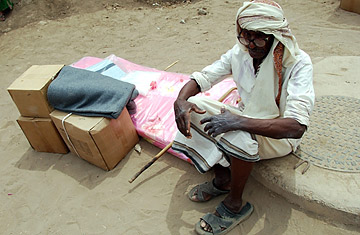
An elderly Yemeni man in Aden, Yemen, after being displaced from the city of Zanjibar following bloody battles between al-Qaeda gunmen and the Yemeni military forces, 13 June 2011.
Have militants from Al-Qaeda in the Arabian Peninsula (AQAP) taken control of territory in southern Yemen? At the end of May, armed militants descended from the surrounding mountains into the city of Zinjibar, the capital of the Abyan Governorate, which is just a few miles from the cosmopolitan port of Aden. The militants were able to seize control of the city and adjacent villages with ease, according to Abyan residents and eyewitnesses who say that Yemen's elite American-trained counter-terrorism unit inexplicably withdrew from the area hours before the attack.
The government of President Ali Abdullah Saleh declared that AQAP had seized the area. Since then, Sana'a has launched air strikes and artillery barrages on suspected AQAP sites in the area, forcing thousands of Abyan residents to flee. Al-Qaeda, however, has not claimed to have taken Zinjibar; and many conspiracy-minded Yemenis believe that the gravity of the terrorist threat has been exaggerated, if not created, by the Saleh regime in order to burnish his boast that only he stands in the way of the militant organization's plans to turn Yemen into a major base of terror operations. While Al-Qaeda operatives certainly do exist, even such implacable Saleh foes as Harak — which wants South Yemen to secede — believes the terror group will melt away and no longer be a factor once Saleh gives up all pretense to power.
(Saleh, who was badly injured in an attack on his palace on June 3, appeared briefly on television on Thursday. He delivered a defiant message to his opponents. However, it was apparent that his health is fragile: his arms were bandaged, the skin on his face darker, as if scorched, and the wrappings of traditional Yemeni headgear that he wore on TV may be hiding head wounds. He remains in Saudi Arabia, recuperating from his injuries but insists he is not surrendering the Presidency.)
No matter who is behind the militants in Zinjibar, one thing is clear: the fighting in Abyan has created a humanitarian crisis. According to a recent United Nations High Commissioner for Refugees fact finding mission, the plight of internally displace persons (IDPs) from Abyan is the worst since the last year's war in the northern governorate of Sa'ada led to the tens of thousands of people escaping from their villages. Now, Abyan's IDP's are crowded into small classrooms where families of more than 20 are cramped together. The heat is intense and several elderly denizens of the camp were being fanned by concerned family members.
Abdullah Fadhli Al-Qowd, 55, fled his village and headed for Aden. He is now living in one of hundreds of IDP camps in the port city with his 11 children, his mother and his four brothers and their families. "We couldn't find shelter from the constant airstrikes and we had no water to drink. Our only choice was to try and make our way to Aden. Thank God, my family and I made it here unharmed," he says, sitting at a small child-sized school desk at a school in the Crater district of Aden that has been turned into an IDP shelter. "My neighbor's house was completely destroyed by artillery. That's when I decided to take my family and flee to Aden," says Saleh Mahdi Humaid, from the Abyan village of Mukhim.
For these IDP's, the reasons why they were forced out of their homes are ambiguous. They aren't sure of the identities of the people who invaded their region. "Who are these armed men? The government says they are Al-Qaeda but how do they know? I saw them. They were wearing regular clothes, they spoke normally. I just don't understand what is happening," says Al-Qowd in a dejected tone. His elderly mother sitting beside him raised her hands in disbelief, "I saw with my own eyes these men attacking the city and soldiers running in the opposite direction."
"We don't have enough food to eat. We're hungry," says Humaid, drinking from a bottle of water. "This water is almost boiling hot," he adds. "The Saleh regime is the absolute worst government in the world. He has done this to us. The only way for this to end is for the revolution to succeed," says Al-Qowd. But other residents of the IDP camp were less defiant and more terrified of what the future may hold. "What's stopping [the militants in Abyan] from coming to Aden? They're going to fight their way into the city. Where will we go after that, Somalia?" says Yaseen Mukhare, a man the residents of the camp have appointed to represent them in meetings with the Yemeni government and international aid organizations.
Fears of an attack on Aden are widespread throughout the city. Many Adenis are preparing to flee the city or to stand and fight to defend their homes, well aware of an unusual lack of military presence. "Zinjibar was completely abandoned by the Yemeni government," says Mohammed Kassim Noman, chairmen of the Yemen Center for Human right Studies who has been working closely with Abyan IDPs to educate them about their civil, economic and human rights. "There are some Al-Qaeda fighters in this group of militants but only a few," he insists, echoing the popular belief. "The militias are funded and supported by the regime."
Nervous residents of Aden are also terrified that militants may make an attempt to seize control of their city but they are convinced that it is Saleh's refusal to turn over power is creating a vacuum that enables these militants to move freely across the south.
